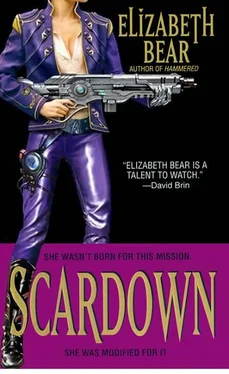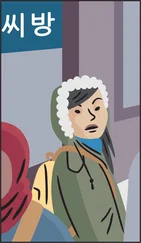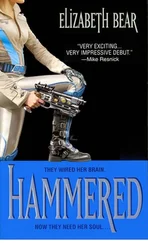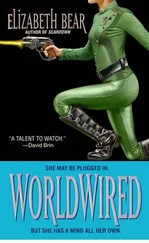Elizabeth Bear
SCARDOWN
Jenny Casey — 2
This book is dedicated to
my parents, Karen Westerholm
and Steve Wishnevsky, and
to my grandfather Henry Westerholm,
for the run of their
science fiction collections
It takes a lot of people to write a novel. This one would not have existed without the assistance of my very good friends and first readers (on and off the Online Writing Workshop for Science Fiction, Fantasy, & Horror) — especially but not exclusively Kathryn Allen, Rhonda Garcia, Jaime Voss, Chris Coen, Tara Devine, Chelsea Polk, and Larry West. I am even more deeply indebted to Stella Evans, M.D., to whom I owe whatever bits of the medical science and neurology are accurate; to M.Cpl. S. K. S. Perry (Canadian Forces), Lt. Penelope K. Hardy (U.S. Navy), and Capt. Beth Coughlin (U.S. Army), without whom my portrayal of military life would have been even more wildly fantastical; to Leah Bobet, my native guide to Toronto; to Meredith L. Patterson, linguist and computer geek, for assistance with interspecies linguistic theory; to Dena Landon, Sarah Monette, and Kelly Morisseau, francophones extraordinaire, upon whom may be blamed any correctness in the Québecois — especially the naughty bits; to Sue Yurcic, former Boeing test pilot, for obvious reasons; to Dr. Jacqueline A. Hope, geophysicist, and Dr. Ian Tregillis, physicist, for making Richard sound like I knew what he was talking about; to Dr. Peter Watts, biologist, for helping make the aliens alien ; to John Borneman for help with my math; to my agent, Jennifer Jackson, my copy editor, Faren Bachelis, and to my editor, Anne Groell, for too many reasons to enumerate; and to Chris, who is patient with the foibles of novelism.
The failures, of course, are my own.
In the interests of presenting a detailed personal perspective on a crucial moment in history, we have taken the liberty of rendering Master Warrant Officer Casey's interviews — as preserved in the Yale University New Haven archives — in narrative format. Changes have been made in the interests of clarity, but the words, however edited, are her own.
The motives of the other individuals involved are not as well documented, although we have had the benefit of our unique access to extensive personal records left by Col. Frederick Valens. The events as presented herein are accurate; the drives behind them must always remain a matter of speculation, except in the case of Dr. Dunsany — who left us comprehensive journals — and “Dr.” Feynman, who kept frequent and impeccable backups.
Thus, what follows is a historical novel of sorts. It is our hope that this more intimate annal than is usually seen will serve to provide future students with a singular perspective on the roots of the civilization we are about to become.
— Patricia Valens, Ph.D.
Jeremy Kirkpatrick, Ph.D.
"Soldier,
I wish you well."
— A.E.Housman
1200 Hours
Thursday 2 November, 2062
HMCSS Montreal
Under way
The Montreal has wings.
They unfurl around her, gossamer solar sails bearing a kilometers-long dragonfly out of high Earth orbit and into the darkness where she will test herself, and me. She's already moving like a cutter through night-black water when Colonel Valens straps me to the butter-soft leather of the pilot's chair and seats the collars. I'm wearing the damned uniform he demanded; it's made for this, with a cutout under my jacket for the interface.
Cold metal presses above my hips, against the nape of my neck. There's a subtle little prickle when the pins slide in, and my unauthorized AI passenger chuckles inside my ear.
Gonna be okay out there, Dick?
“With a whole starship to play in? Sure. Besides, I have my other self to wait for. Whenever Valens lets him into the system, pinions clipped.” He grins in the corner of my prosthetic eye. Virtual Richard. I'll miss him. “I'll go when you enter the ship. They'll miss me in the fluctuation.”
Godspeed, Richard.
“Be careful, Jenny.”
Spit-shined Colonel Valens raises three fingers into my line of sight. I draw one breath, deep and sweet, skin prickling with chill and cool sweat.
Valens's fingers come down. One. Two. Three.
And dark.
My body vanishes along with Valens, the observers, the bridge. Cold on my skin and the simulations were never like this. Richard winks and vanishes, and my head feels — empty, all of a sudden, and ringing hollow. It's strange in there without him. And then I forget myself in the Montreal, as the sun pushes my sails and the stars spread out before me like buttercream frosting on a birthday cake. Heat and pressure like a kiss gliding down my skin, and the Montreal 's sails are eagle's wings cradling a thermal.
Eagle wings. Eagle feathers. A warrior dream.
I pull the ship around me like a feathered skin and fly .
Valens's voice in my ear as Richard leaves me. “All good, Master Warrant?”
“Yes, sir.” I hate the distractions. Hate him talking when I'm trying to fly. The simulations were mostly hyperlight; I didn't get to play much in space I could see. Only feel, like the rough curve of gravity dragging you down a water slide, and then the darkness pulling you under.
This is easy.
This is fun. Richard? I don't expect an answer. He's gone into the ship, part of the Montreal now with her cavernous computer systems and the nanotech traced through her hull, her skin, wired into my brain stem so her heartbeat is my heartbeat, the angle of her sails is the angle of my wings.
“Got you, Jenny,” he says, and if my heart were my heart it would skip a beat. I can't feel myself grin.
Dick!
“Guess what?” His glee tastes like my own. “Jenny, the nanites can talk to each other.”
What do you mean?
“I mean I can sense the alien ships on Mars — the ship tree and the metal one — and I can sense you and the other pilots. And the Chinese vessel following us.”
The Huang Di?
“On our tail. No lag, Jenny.”
I don't understand. No lag?
“No lightspeed lag. Instantaneous communication. I think I was right about the superstrings. It's not so much faster-than-light technology as… sneakier-than-light .”
Implications tangle in my brain. Richard .
“Yes?”
Can you feel our benefactors? Somebody alien left the ships on Mars for us to find. Somebody alien meant for us to come find them, too.
“And they can feel me,” he answers. “Jenny, I can't talk to them. Can't understand them. But I know one thing.
“They're coming.”
I almost stall the habitation wheel as the Montreal and I continue our ascent.
Three hours previous
0900 Hours
Thursday 2 November, 2062
HMCSS Montreal
Earth orbit
Don't all kids want to grow up to be astronauts? It's not a strange thing to ask when you are hauling yourself along a series of grab rails on your way to the bridge of a starship, floating ends of hair brushing your ears like fingertips.
Let me say that again in case you missed it.
A star ship.
Her name is the Montreal, and she's as cold inside as a tin can on an ice floe. Her outline is gawky, fragile-seeming, counterintuitive to an eye that expects things that fly to look like things that fly. Instead, she's a winged wheel stuck partway down a weather-vane arrow, a design that keeps the hazardous things in the engines as far as possible from the habitation module without compromising the angle of thrust. The wheel turns around the shaft of the arrow, generating there-is-no-such-thing-as-centrifugal-force, which will hold us to the nominal floor once we're on it. There's no gravity in this, the central shaft. You could float along it if you wanted, and never fear falling.
Читать дальше












